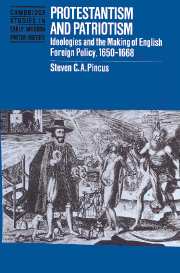Book contents
- Frontmatter
- Contents
- Acknowledgments
- List of abbreviations
- 1 Introduction
- Part I The rod of the Lord: ideology and the outbreak of the First Anglo-Dutch War
- Part II To unite against the common enemy: the 1654 Treaty of Westminster and the end of apocalyptic foreign policy
- Part III Popery, trade, and universal monarchy: ideology and the outbreak of the Second Anglo-Dutch War
- Part IV The Medway, Breda, and the Triple Alliance: the collapse of Anglican Royalist Foreign Policy
- 17 Historiographical overview
- 18 The circulation of news and the course of the war
- 19 The popular understanding of the war
- 20 The government's war aims
- 21 An Orangist revolution
- 22 Victory denied and wartime consensus shattered
- 23 The rise of political opposition
- 24 The road to Chatham: the decision not to send out a battle fleet
- 25 The demise of Anglican Royalist foreign policy
- Conclusion
- Bibliography
- Index
- Titles in the series
24 - The road to Chatham: the decision not to send out a battle fleet
Published online by Cambridge University Press: 01 October 2009
- Frontmatter
- Contents
- Acknowledgments
- List of abbreviations
- 1 Introduction
- Part I The rod of the Lord: ideology and the outbreak of the First Anglo-Dutch War
- Part II To unite against the common enemy: the 1654 Treaty of Westminster and the end of apocalyptic foreign policy
- Part III Popery, trade, and universal monarchy: ideology and the outbreak of the Second Anglo-Dutch War
- Part IV The Medway, Breda, and the Triple Alliance: the collapse of Anglican Royalist Foreign Policy
- 17 Historiographical overview
- 18 The circulation of news and the course of the war
- 19 The popular understanding of the war
- 20 The government's war aims
- 21 An Orangist revolution
- 22 Victory denied and wartime consensus shattered
- 23 The rise of political opposition
- 24 The road to Chatham: the decision not to send out a battle fleet
- 25 The demise of Anglican Royalist foreign policy
- Conclusion
- Bibliography
- Index
- Titles in the series
Summary
The critics of the government “in whose hands we are yet entirely as to his Majesty's supply” were creating so much mischief in Parliament that “you will not wonder we make no more despatch in our preparations for the next year,” complained Arlington to Sandwich who was now ambassador in Spain. At the moment that the Dutch fleet was systematically burning his navy and terrifying the residents of his capital, Charles II fumed to Sir Thomas Osborne, one of the Duke of Buckingham's closest associates, that “we might thank those men” – those Parliamentary allies of Buckingham – for the Dutch fleet lying now upon our coast, for had the money been given in time “we had had a fleet in readiness” So powerful was this analysis, so seemingly prophetic was Arlington after the devastating Dutch raid on the Medway in June 1667, that it has become the accepted explanation for the English failure to set out a fleet in the spring of 1667. Members of the House of Commons, whether out of a lust for personal power or because they knew the country was simply unable to finance another year's campaign, are said to have successfully obstructed the war effort.
The enthusiasm with which members of the House of Commons had resolved to support their king with a generous supply for the war at the outset of the Parliamentary session, and the consistently anti-absolutist tone of much of the criticism of the conduct of the war, demand a reconsideration of the government's case.
- Type
- Chapter
- Information
- Protestantism and PatriotismIdeologies and the Making of English Foreign Policy, 1650–1668, pp. 379 - 406Publisher: Cambridge University PressPrint publication year: 1996



